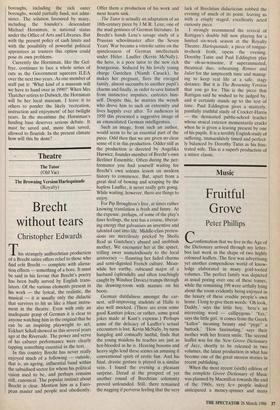Theatre
The Tutor (Old Vic) The Browning Version/Harlequinade (Royalty)
Brecht without tears
Christopher Edwards
This strangely unBrechtian production of a Brecht satire offers relief to those who find echt Brecht — complete with aliena- tion effects — something of a bore. It must be said in his favour that Brecht's poetry has been badly served by English trans- lators. Of the various elements present in his work — the lyrical, the realistic, the Musical — it is usually only the didactic that survives to hit us like a blunt instill- ment in the theatre. Even with only an inadequate grasp of German it is clear to anyone watching him in the original that he can be an inspiring playwright to act; Eckhart Schall showed us this several years ago at the Riverside. The power and verve of his cabaret performance were clearly tapping something essential in the text. In this country Brecht has never really enjoyed much of a following — outside, that is, an ageing, influential band within the subsidised sector for whom his political vision used to be, and perhaps remains still, canonical. The popular instinct about Brecht is clear. Mention him as a Euro- pean master and people nod obediently. Offer them a production of his work and most hearts sink.
The Tutor is actually an adaptation of an 18th-century piece by J.M. R. Lenz, one of the mad geniuses of German literature. In Brecht's hands Lenz's savage study of a Prussian schoolmaster after the Seven Years' War became a vitriolic satire on the spinelessness of German intellectuals under Hitler. Lauffer (Kevin McNally), the hero, is a poor tutor to the new rich bourgeoisie. Seduced by his lovely young charge Gustchen (Niamh Cusack), he makes her pregnant, flees the enraged family, almost succumbs to another pupil's charms and finally, in order to save himself from instinctive impulses, castrates him- self. Despite this, he marries the wench who drove him to such an extremity and lives happily ever after. To audiences in 1950 this presented a suggestive image of an emasculated German intelligentsia.
Such an image, from such an author, would seem to be an essential part of the piece. Odd then that we are given no clear sense of it in this production. Odder still as the production is directed by Angelika Hurwicz, founder-member of Brecht's own Berliner Ensemble. Often during the per- formance you find yourself waiting for Brecht's own solemn lesson on modern history to commence. But, apart from a great deal of bowing and scraping by the hapless Lauffer, it never really gets going. While waiting, however, there are things to enjoy.
For Pip Broughton's free, at times rather knOwing translation is fresh and funny. At the expense, perhaps, of some of the play's finer feelings, the text has a coarse, liberat- ing energy that galvanises an inventive and talented cast into life. Middle-class preten- sions are mercilessly pricked by Sheila Reid as Gustchen's absurd and snobbish mother. We encounter her at the spinet, trilling away unmelodiously to the local aristocracy — flaunting her faded charms and semi-digested French culture. Mean- while her earthy, rubicund major of a husband (splendidly and often touchingly caught by Windsor Davies) tramps through the drawing-room with manure on his boots.
German dutifulness amongst the ear- nest, self-improving students at Halle is also well mocked. (There are even some good Kantian jokes; or rather, some good jokes made at Kant's expense.) Perhaps some of the delicacy of Lauffer's sexual encounters is lost. Kevin McNally, by turns hangdog and comically lustful, finds that the young maidens he teaches are just as hot-blooded as he is. Heaving bosoms and heavy sighs lend these scenes an amusing if conventional spirit of erotic fun. And his final, drastic gesture is played in a similar vein. I found the evening a pleasant surprise. Dread at the prospect of yet another round of Brechtian solemnity proved unfounded. Still, there remained the nagging if perverse feeling that the very lack of Brechtian didacticism robbed the evening of much of its point, leaving us with a crisply staged, excellently acted curiosity piece.
I strongly recommend the revival of Rattigan's double bill now playing for a limited six-week season at the Royalty Theatre. Harlequinade, a piece of tongue- in-cheek froth, opens the evening. Dorothy Tutin and Paul Eddington play the oh-so-winsome, if superannuated, theatrical duo, rehearsing Romeo and Juliet for the umpteenth time and manag- ing to keep real life at a safe, stagy distance. But it is The Browning Version that you go for. This is the piece that Rattigan said he wished to be judged by, and it certainly stands up to the test of time. Paul Eddington gives a masterly, painfully truthful study of Crocker-Harris — the dessicated public-school teacher whose stoical exterior momentarily cracks when he is given a leaving present by one of his pupils. It is a terribly English study of suffering, immaculately timed and perfect- ly balanced by Dorothy Tutin as his frus- trated wife. This is a superb production of a minor classic.


















































 Previous page
Previous page